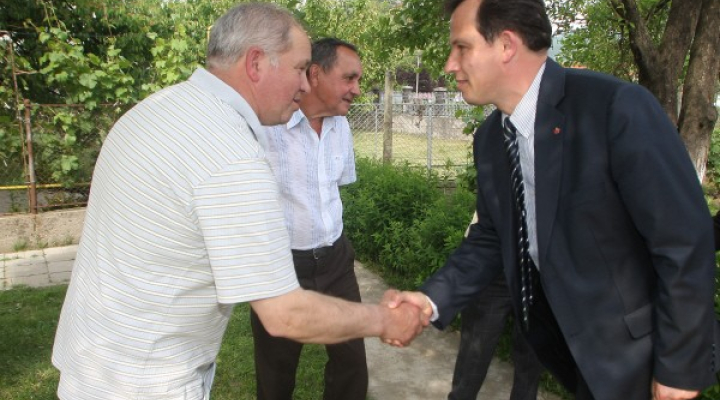Csaba Sógor's campaign-2009
An independent Hungarian school, a fair deal for pensioners.
These were some of the issues raised when MEP candidate Sógor visited
the area around Nagybánya. In the course of dialogue with local
pensioners at a civil debate in which he participated in Misztótfalu
[Tãuţii de Jos], Sógor said that the European Parliament is drafting
several pieces of legislation, such as, for example, proposed new
regulations on pensions for widows and widowers, whereby the surviving
spouse would receive a part of the former income of the deceased party.
With regard to the unwieldiness of the European Parliament's operations, Sógor noted that the will of 500 million citizens of 27 countries has to be taken into consideration from day to day, and this is why the institution appears to be so slow to act. "However, a growing number of decisions related to important aspects of our lives are being made in Brussels, many more than in Bucharest. This is why it is by no means irrelevant to the Hungarian community in Transylvania how many representatives it has there who will speak out about their needs and their greatest problems, and about what kind of people the Hungarians in Transylvania are," he added, underlining the importance of the EP elections on 7 June.
For the Hungarian community in Színérváralja [Seini], the most important question is how they can launch their own independent Hungarian school. Locals explained that although their local school currently has a Hungarian stream for years 1-8, they are determined to establish an independent Hungarian institution. "One of the fundamental prerequisites for competitive Hungarian-language education is the creation of teaching institutions of a European standard, both in the solely Hungarian and the interethnic environment. In knowledge of this, in the past four years alone we have initiated the operation of 20 new Hungarian-owned educational institutions," Sógor informed those present. He added that this represents a key issue not only at the local level but in Brussels as well, since the creation of a pan-European legislative framework for the protection of minorities is one of the top priorities of the Democratic Alliance of Hungarians in Romania (RMDSZ).
With regard to the unwieldiness of the European Parliament's operations, Sógor noted that the will of 500 million citizens of 27 countries has to be taken into consideration from day to day, and this is why the institution appears to be so slow to act. "However, a growing number of decisions related to important aspects of our lives are being made in Brussels, many more than in Bucharest. This is why it is by no means irrelevant to the Hungarian community in Transylvania how many representatives it has there who will speak out about their needs and their greatest problems, and about what kind of people the Hungarians in Transylvania are," he added, underlining the importance of the EP elections on 7 June.
For the Hungarian community in Színérváralja [Seini], the most important question is how they can launch their own independent Hungarian school. Locals explained that although their local school currently has a Hungarian stream for years 1-8, they are determined to establish an independent Hungarian institution. "One of the fundamental prerequisites for competitive Hungarian-language education is the creation of teaching institutions of a European standard, both in the solely Hungarian and the interethnic environment. In knowledge of this, in the past four years alone we have initiated the operation of 20 new Hungarian-owned educational institutions," Sógor informed those present. He added that this represents a key issue not only at the local level but in Brussels as well, since the creation of a pan-European legislative framework for the protection of minorities is one of the top priorities of the Democratic Alliance of Hungarians in Romania (RMDSZ).











